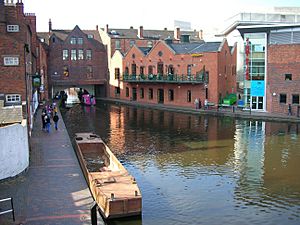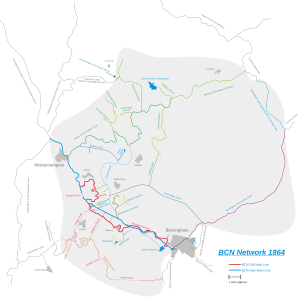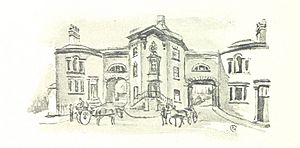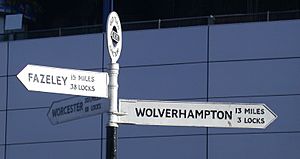Birmingham Canal Navigations facts for kids
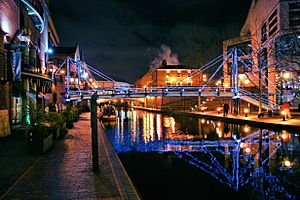
The Birmingham Canal Navigations (often called BCN) is a huge network of canals. These canals connect the cities of Birmingham and Wolverhampton. They also link to the eastern part of the Black Country in England. The BCN joins up with other canals across England.
At its busiest, the BCN had about 160 miles (257 km) of canals. Today, over 100 miles (160 km) are still open for boats. Most boats on the BCN now are narrowboats used by tourists or people living on them.
Contents
History of the BCN Canals
The very first canal in this area was the Birmingham Canal. It was built between 1768 and 1772. A famous engineer named James Brindley oversaw its construction. This canal started at the edge of Birmingham. It ended near Gas Street Basin, connecting to the Staffordshire and Worcestershire Canal.
Later, the Birmingham and Fazeley Canal was built in 1784. This canal went from Birmingham to Tamworth. Soon after, the two canal companies joined together. At first, they had a very long name! But by 1794, they became known as the Birmingham Canal Navigations. This new name came as the canal network grew even bigger.
Understanding Canal Levels
The BCN is built on three main levels, like steps for water. Each level has its own large reservoir to hold water.
- The Birmingham Level is 453 feet (138 meters) above sea level.
- The Wolverhampton Level is 473 feet (144 meters) above sea level.
- The Walsall Level is 408 feet (124 meters) above sea level.
These different levels are connected by special gates called locks. Locks help boats move up or down between the water levels.
Some parts of the BCN are on their own special levels too.
- The Titford Canal is very high, at 511 feet (156 meters) above sea level. It gets water from Titford Reservoir.
- A small part of the BCN Old Main Line, near Smethwick, was once 491 feet (150 meters) high. Pumps were used to move water back up to this high point. Later, engineer John Smeaton lowered this section by 18 feet (5.5 meters). This change made it easier for boats to travel.
Canals of the BCN Network
The BCN includes many different canals. Here are some of the main ones:
- BCN Main Line: This is the main route from Aldersley Junction to Gas Street Basin. It uses parts of the older canal.
- Old Main Line: This was the first main canal route.
- New Main Line: A newer, straighter route for the Birmingham Canal.
- Birmingham and Fazeley Canal: This canal goes east from Old Turn Junction. It connects to the Coventry Canal.
- Dudley Canal: An important canal with several branches.
- Bumble Hole Branch Canal
- Dudley Canal Line No 1 (includes Dudley Tunnel)
- Dudley Canal Line No 2 (includes Lapal Tunnel)
- The Engine Arm
- Gower Branch Canal: Connects different water levels using three locks.
- Icknield Port Loop: An older part of the main line, now used to feed water from Edgbaston Reservoir.
- Netherton Tunnel Branch Canal
- Rushall Canal
- Soho Loop: An old, winding route that was cut off by improvements.
- Spon Lane Locks Branch: Part of the original Wednesbury Canal.
- Titford Canal
- Tame Valley Canal: A newer canal that makes some northern routes shorter.
- Walsall Canal: Connects the main line to Walsall.
- Wednesbury Old Canal: Another part of the original Wednesbury Canal.
- Wyrley and Essington Canal: This canal was bought by the BCN in 1840.
- Anglesey Branch
- Birchills Branch
- Cannock Extension Canal
- Daw End Branch Canal
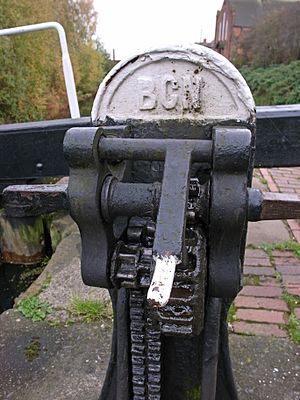
Connecting Canals
The BCN connects to other important canals in England:
- Coventry Canal: Joins at Fazeley Junction.
- Grand Union Canal: Connects at Salford Junction and Bordesley Junction.
- Staffordshire and Worcestershire Canal: Joins at Aldersley Junction.
- Stourbridge Canal
- Worcester and Birmingham Canal: Connects the BCN Main Line to the River Severn.
Important Water Features
- Chasewater: This reservoir feeds water into the Wyrley and Essington Canal.
- Edgbaston Reservoir: Also known as Rotton Park Reservoir. It gets water from Titford Reservoir and supplies the Birmingham Old and New Line canals.
Famous Engineers
Many clever engineers helped build and improve the BCN:
- James Brindley
- Thomas Dadford
- John Smeaton
- Thomas Telford
- James Walker
The BCN Society
The BCN Society is a group that helps take care of the canals. It is a charity that started in 1968. The society works to protect and improve the BCN. They also encourage people to enjoy the canals. The society publishes a magazine called Boundary Post. Since 1983, they have put up special signposts at most canal junctions.
 | William M. Jackson |
 | Juan E. Gilbert |
 | Neil deGrasse Tyson |


